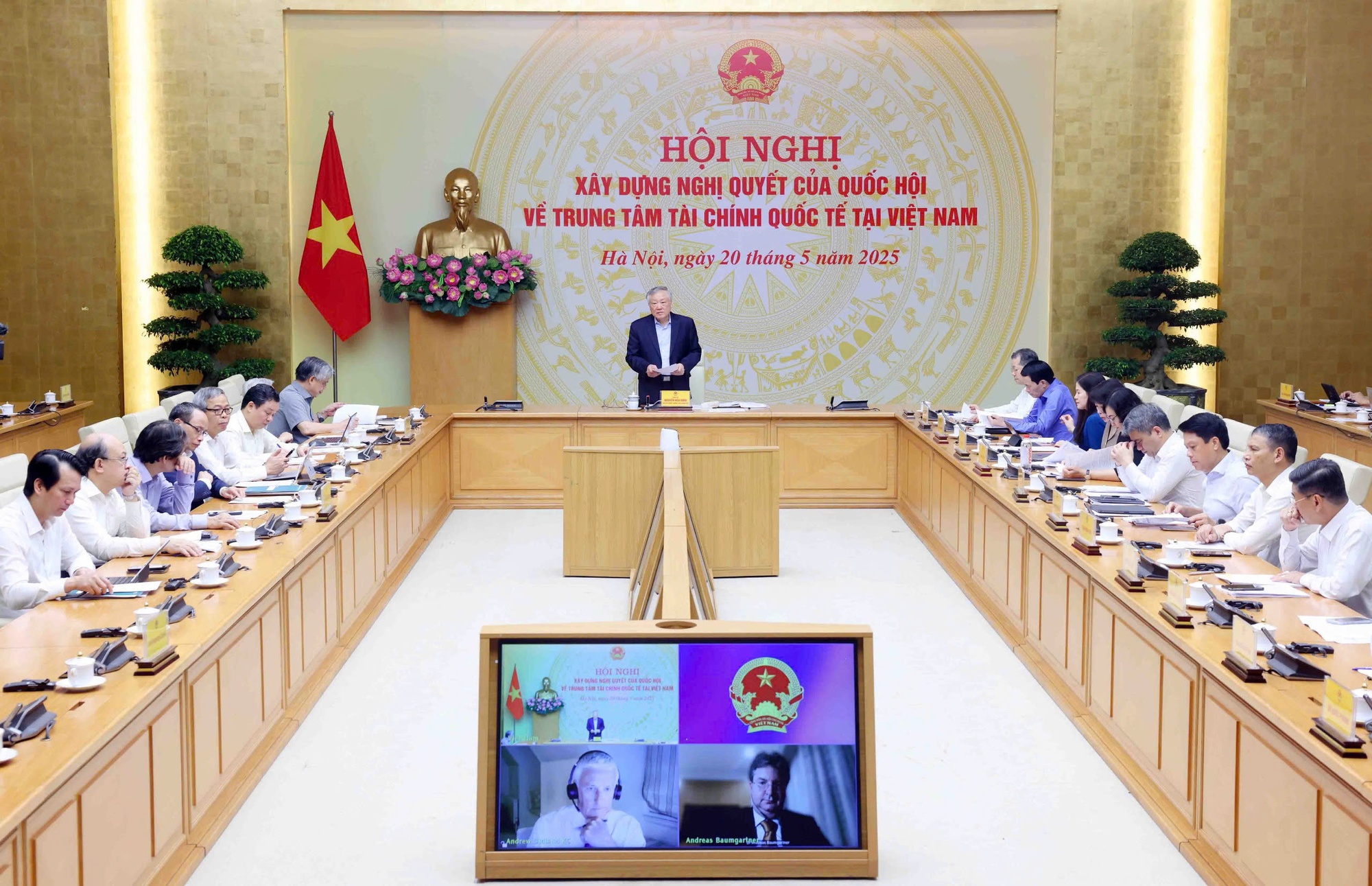Permanent Deputy Prime Minister Nguyen Hoa Binh chaired a hybrid conference in Hanoi on May 20 to discuss a draft resolution of the National Assembly on establishment of an international financial center (IFC) in Vietnam.
The event marked a key step in shaping mechanisms and policies to support the country's ambition of becoming a regional financial hub.
Speaking at the conference, Mr. Nguyen Van Quang, Secretary of the Party Committee of central Da Nang city, acknowledged that while the concept of an IFC is not new globally, it remains both novel and challenging for Vietnam. He emphasized the need to strike a balance between aligning with international norms and ensuring compatibility with domestic laws.
Representing one of the key localities in the initiative, Mr. Quang expressed appreciation for the insights shared by both domestic and international delegates. He noted a broad consensus on the strategic need for Vietnam to develop an IFC. The proposed model may take the form of either two independent centers or a single center operating across two sites—Da Nang and Ho Chi Minh City.
According to Mr. Quang, either approach—separate or dual-location operation—would enhance Vietnam’s ability to diversify investment environments, attract global financial institutions, mitigate risks, and strengthen regulatory oversight. He added that Da Nang has already begun preparing both hard and soft infrastructure, as well as relevant ecosystems, to support the center's future operations.
Echoing this readiness, Mr. Nguyen Van Dung, Vice Chairman of the Ho Chi Minh City People’s Committee, confirmed that the city is also reviewing and proposing tailored mechanisms and policies. At the same time, it is accelerating infrastructure upgrades and workforce training in preparation for the center’s eventual launch.

Praising the Vietnamese government and relevant agencies for their commitment to developing international financial centers, Mr. Jochen Biedermann, Managing Director of the World Alliance of International Financial Centers (WAIFC), emphasized that beyond physical infrastructure, Vietnam must pay special attention to building robust digital and software infrastructure. This, he stressed, is essential to ensure the efficient operation of international financial centers in Ho Chi Minh City and Da Nang once they become operational.
Equally critical, he added, is the need for a comprehensive human resource development strategy. Vietnam must proactively train and prepare a highly skilled workforce to support the smooth functioning of the centers. He warned against fragmented or piecemeal investment, urging the country to ensure adequate and synchronized resource allocation for sustainable development of the financial hubs.
Drawing on international best practices, particularly the modern financial center model in Dubai, Dr. Andreas Baumgartner, CEO and Co-founder of The Metis Institute, recommended that Vietnam consider establishing a single international financial center that operates across two locations: Da Nang and Ho Chi Minh City. Such a model, he noted, would allow for unified management while leveraging the distinct advantages and operational independence of each city.
Leaders and representatives from international financial organizations, institutions, businesses, and investors at the conference expressed strong support for Vietnam’s vision. They affirmed their commitment to accompany the country throughout the development and operational phases of the financial center through concrete partnerships, technical assistance, and investment.
Speaking at the event, Permanent Deputy Prime Minister Nguyen Hoa Binh reiterated that the Vietnamese government's strategic direction is to develop a single international financial center operating in both Da Nang and Ho Chi Minh City.
He affirmed the government’s commitment to creating a breakthrough legal framework that maximizes Vietnam’s unique advantages while adhering to international laws and standards. The framework will promote innovation, ensure tailored and attractive policies for investors, and strike a balance between the interests of the state, investors, and the public. It will also be designed in alignment with Vietnam’s current governance and administrative capabilities.
In terms of regulatory development, Permanent Deputy PM Nguyen Hoa Binh stressed that Vietnam will thoroughly study international laws, practices, and standards. However, this will not be a simple or mechanical replication. Instead, the country will adopt a carefully selected and customized approach, adapted to Vietnam’s specific conditions and context. This perspective was strongly endorsed by many delegates and experts at the conference and in earlier forums.
On the legal infrastructure, the government will first focus on finalizing a draft National Assembly Resolution for parliamentary review and approval. Based on this foundation, a series of government decrees will be issued, offering a comprehensive set of incentives and support policies, including tax breaks, infrastructure support, immigration and residency facilitation, and labor regulations, to attract and retain investors participating in Vietnam’s international financial centers.









 Google translate
Google translate